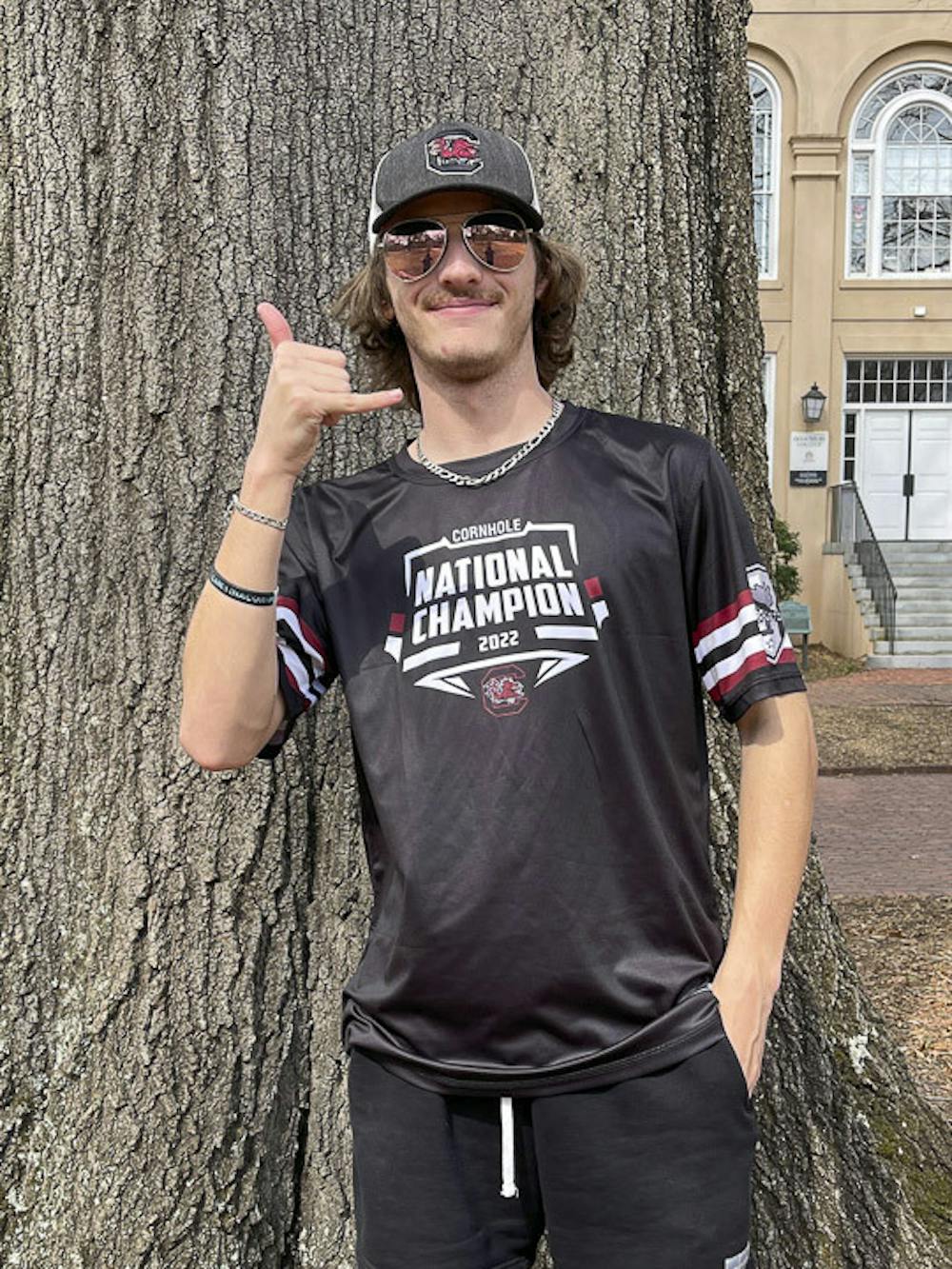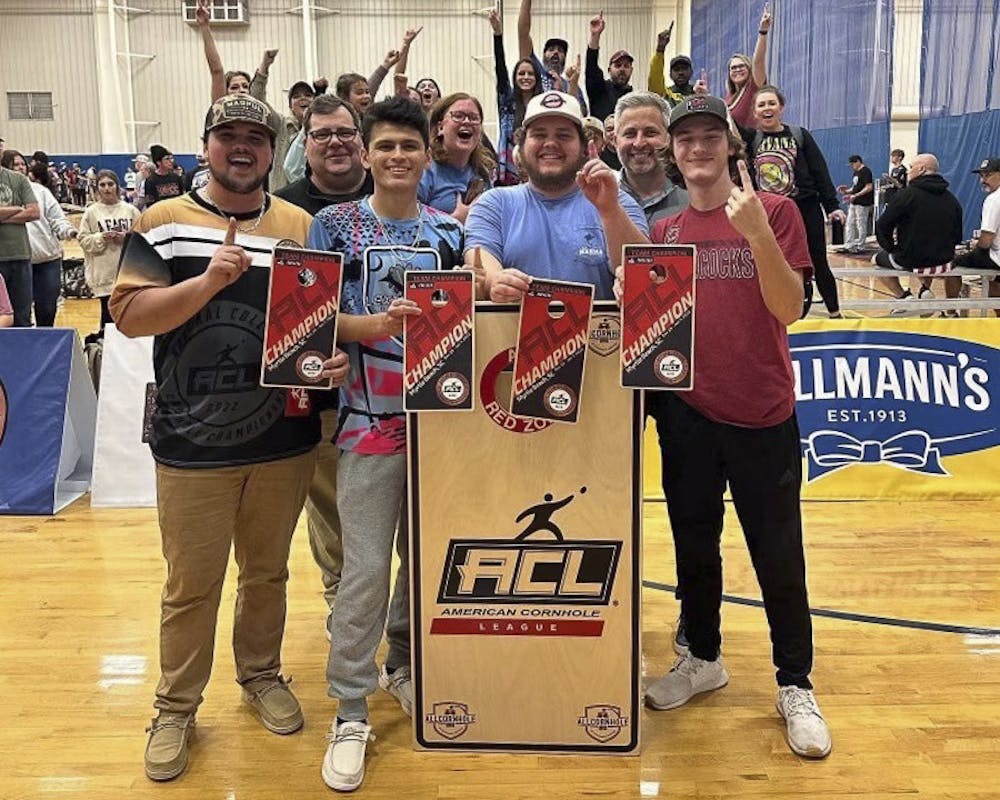2022 mechanical engineering graduate Avery Snipes began playing cornhole in the midst of the COVID-19 pandemic.
“There wasn’t nothing really on TV, on ESPN, except cornhole,” Snipes said. “It kind of piqued my interest and from there, it just blossomed into playing pretty regularly and getting my friends into it and then meeting other people who had also gotten into it.”
Less than three years later, Snipes, would find himself, along with three other USC students, earning two titles at the American Cornhole League’s National College Cornhole Championship, one in the doubles competition and another in the overall team event.
South Carolina's championship-winning squad originally got in contact with one another while playing in local cornhole leagues, such as the Lexington Cornhole League — an event for players of all skill levels to meet weekly to play the sport — where Snipes met his future teammates, including doubles partner Angel Camarena.
While Snipes said he and Camarena, a third-year sport and entertainment management student, were not close friends when they first met around a year and a half ago, they eventually grew closer as they competed in weekly tournaments together, including last year's national championship event.
Camarena said that playing with Snipes as much as possible helped the two develop stronger chemistry.
“Any chance that we had to play in a local tournament — whether it be just a fundraiser or a big-time tournament — we’d play together,” Camarena said. “We got to learn our strengths and weaknesses, what we like to do and what we don’t like, and our bond just kept getting stronger and stronger as teammates, and we started learning to trust each other.”
Hoping to improve from their performance in the 2021 national tournament, the pair qualified for this year's competition through a regional ACL “open” event. South Carolina's team, consisting of Snipes, Camarena, fourth-year operations and supply chain student Diego Franklin and first-year sport and entertainment management student Nolan Cochran, also became one of the first squads nationwide to earn an automatic bid to the tournament.

Franklin said the event was a big step up from the leagues he had played in previously and forced him to adapt to a new playing environment.
“It was quite stressful for me because it was more of an anxiety shock almost being around, just having fun, thinking it was a fun game, to being around that many people. You just feel a lot of pressure," Franklin said. "At least for me, (it’s) like presenting at the front of class — even though you know most of the people in the class, it still puts a lot of pressure, it puts the spotlight on you.”
In the doubles event, Snipes and Camarena finished as a No. 2 overall seed in the winners bracket after six round-robin matches and advanced all the way to the national championship game, playing against Oklahoma State’s Reid Palmer and Tyler Davis.
Snipes said he and Camarena prepared for the championship just like they had for every match they competed in previously.
“I told Angel going into the final game, ‘We're here. We’ve done everything that we’ve wanted to do — anything now’s just great and it's just extra. We’ve made it here, let’s just go ahead and win it,'” Snipes said.
South Carolina experienced its share of adversity early in the match, falling behind 3-0 after the first round of play. The deficit would not last long, as Snipes and Camarena tied the game at three points each after the fourth round and rallied from behind to clinch the victory by a 9-5 score.
Camarena said realizing he won the victory was a “euphoria moment” for him.
“The initial (goal) was to play on TV, and once we got there, we’re like ‘Let’s set a new goal and try to win this thing,’” Camarena said. “After we won, it was a big sigh of relief because that’s what we had been working towards for the whole year leading up to that, and we embraced each other. It was a beautiful moment.”
While Snipes and Camarena had time to celebrate their doubles championship, they still had unfinished business to accomplish since the team event was the next day.
“I told Angel the same, ‘We don’t need to let up now. There’s two others that came down to participate with us, and winning the teams event would mean just as much to them as us winning the doubles, so let’s just keep doing what we were doing last night and try to carry it over,’” Snipes said.
South Carolina went undefeated in the teams event heading into the championship match against Oklahoma State. After losing its first overall match against the Cowboys, singles round victories by Snipes and Camarena gave the Gamecocks its second title of the event, finishing the competition with a 5-1 match record and a 13-5 game record.
For Franklin, South Carolina's victory served as the culmination of months of hard work after a severe injury rendered him unable to play cornhole until two months before the tournament.
In 2021, Franklin was involved in an accident while riding on his motorcycle that resulted in a broken femur, multiple broken bones broken in both hands and a major concussion. He was later sent to a rehabilitation hospital, where he stayed for the next four weeks to re-learn how to perform basic motor tasks.
Franklin said whenever he looks at images of himself in his hospital bed, it reminds him of how far he has come since the accident.
"It’s just mind-blowing to see how lucky I am to be alive and how lucky I am to be able to progress and still do everything I normally was able to do,” Franklin said. “When something like that happens to you, you can’t let it slow you down — you have to bounce just back and keep trying and trying and doing whatever you can to be able to get back to the shape you were in.”

After winning the National College Cornhole Championship, all four members of the South Carolina team said that cornhole will continue to play a major role in their lives. As Snipes transitions to life in the workforce after college, he said he will keep the door to going pro in cornhole open.
As for Camarena, he plans on participating in a qualifier tournament that could make him an ACL professional. Should he fail to do so, he said he is locked in on working towards another collegiate title.
“If I don’t qualify to be a pro, then I will definitely run it back next year,” Camarena said.

